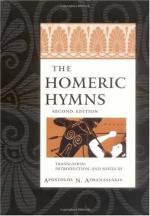On the other side, in the case of Australia, Mr. Tylor writes: “For a long time after Captain Cook’s visit, the information as to native religious ideas is of the scantiest.” This was inevitable, for our information has only been obtained with the utmost difficulty, and under promises of secrecy, by later inquirers who had entirely won the confidence of the natives, and had been initiated into their Mysteries. Mr. Tylor goes on in the same sentence: “But, since the period of European colonists and missionaries, a crowd of alleged native names for the Supreme Deity and a great Evil Deity have been recorded, which, if really of native origin, would show the despised black fellow as in possession of theological generalisations as to the formation and conservation of the universe, and the nature of good and evil, comparable with those of his white supplanter in the land.” {23a} Mr. Tylor then proceeds to argue that these ideas have been borrowed from missionaries. I have tried to reply to this argument by proving, for example, that the name of Baiame, one of these deities, could not have been borrowed (as Mr. Tylor seems inclined to hold) from a missionary tract published sixteen years after we first hear of Baiame, who, again, was certainly dominant before the arrival of missionaries. I have adduced other arguments of the same tendency, and I will add that the earliest English explorers and missionaries in Virginia and New England (1586-1622) report from America beliefs absolutely parallel in many ways to the creeds now reported from Australia. Among these notions are “ideas of moral judgment and retribution after death,” which in Australia Mr. Tylor marks as “imported.” {23b} In my opinion the certainty that the beliefs in America were not imported, is another strong argument for their native character, when they are found with such striking resemblances among the very undeveloped savages of Australia.
Savages, Mr. Hartland says in a censure of my theory, are “guiltless” of Christian teaching. {24} If Mr. Hartland is right, Mr. Tylor is wrong; the ideas, whatever else they are, are unimported, yet, teste Mr. Tylor, the ideas are comparable with those of the black man’s white supplanters. I would scarcely go so far. If we take, however, the best ideas attributed to the blacks, and hold them disengaged from the accretion of puerile fables with which they are overrun, then there are discovered notions of high religious value, undeniably analogous to some Christian dogmas. But the sanction of the Australian gods is as powerfully lent to silly, or cruel, or needless ritual, as to some moral ideas of weight and merit. In brief, as far as I am able to see, all sorts of ideas, the lowest and the highest, are held at once confusedly by savages, and the same confusion survives in ancient Greek belief. As far back as we can trace him, man had a wealth of religious and mythical conceptions to choose from, and different peoples, as they advanced in civilisation, gave special prominence to different elements in the primal stock of beliefs. The choice of Israel was unique: Greece retained far more of the lower ancient ideas, but gave to them a beauty of grace and form which is found among no other race.




